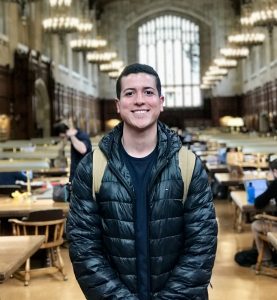Panama Alumni Update by Jose Ignacio Saldana
 In 2012, I made a decision that would impact my career path for the better. I was a second-year law student at Universidad Catolica Santa Maria La Antigua in Panama City, Panama at the time, and although I was enjoying my studies, I was eager to study abroad. I applied to and received the Global UGRAD scholarship, which granted me the opportunity to study abroad for a semester at American University (AU) in Washington, D.C. I can now gladly say that event was a turning point for my career plans; not only did it completely restructure the way I viewed law, it also redefined my concept of what learning entailed.
In 2012, I made a decision that would impact my career path for the better. I was a second-year law student at Universidad Catolica Santa Maria La Antigua in Panama City, Panama at the time, and although I was enjoying my studies, I was eager to study abroad. I applied to and received the Global UGRAD scholarship, which granted me the opportunity to study abroad for a semester at American University (AU) in Washington, D.C. I can now gladly say that event was a turning point for my career plans; not only did it completely restructure the way I viewed law, it also redefined my concept of what learning entailed.
As I began to understand more about the U.S. legal system and the way it is studied, I came to realize the importance of academic training for the practice of law, and how a comparative study of the American system and the Panamanian system could enable me to become a well-rounded professional. I took some law-related classes at American University and quickly realized that the law was taught differently in the U.S. One of the goals of the U.S. legal education is to train students to “think as a lawyer.” Lawyerly thinking at U.S. law schools is generally taught using the Case Method and the Socratic Method. Students read judicial opinions as preparation for each class, and professors ask them questions to help them understand the development of the law. The challenging nature of these methods captivated my attention.
After my semester experience at American University, I decided that I wanted to attend law school in the U.S. I joined a law firm as a paralegal and started saving for what would become my law school applications fund. During my senior year of law school in Panama, I ordered the materials to study for the Law School Admissions Test (LSAT) online. I designed a self-study schedule, and I would study for a couple of hours every night after work. The application process was a little stressful, but I managed to compile my application materials and apply to several law schools in the U.S. One afternoon, after sending an email of continued interest to the University of Michigan Law School Admissions Office, the admissions dean replied notifying me that I had been admitted to Michigan Law—I will always remember this day.
I am now about to graduate from the University of Michigan Law School. It has been three years of learning and meaningful experiences. During my time at Michigan Law, I served as a notes editor of the Michigan Journal of International Law and as president of the International Law Society. Moreover, during the summer of my first year of law school, I interned for a judge in New York. This internship was a great opportunity for me to learn about the judicial decision-making process in the U.S. During the summer of my second year of law school, I worked as a summer associate at a New York law firm. This experience helped me understand some of the differences between the practice of law in Panama and in the U.S.
My time at American University as part of the Global UGRAD program shaped my academic and professional interests, and I hope other international students take advantage of this great opportunity. The piece of advice I would give to students out there is to seek out new opportunities; we never know how new experiences will lead us to take different roads. I certainly did not expect Global UGRAD would lead me to pursue legal studies at one of best law schools in the world. You can be next.
Written by Jose Ignacio Saldana (Panama), a 2012-2013 Global UGRAD student at American University